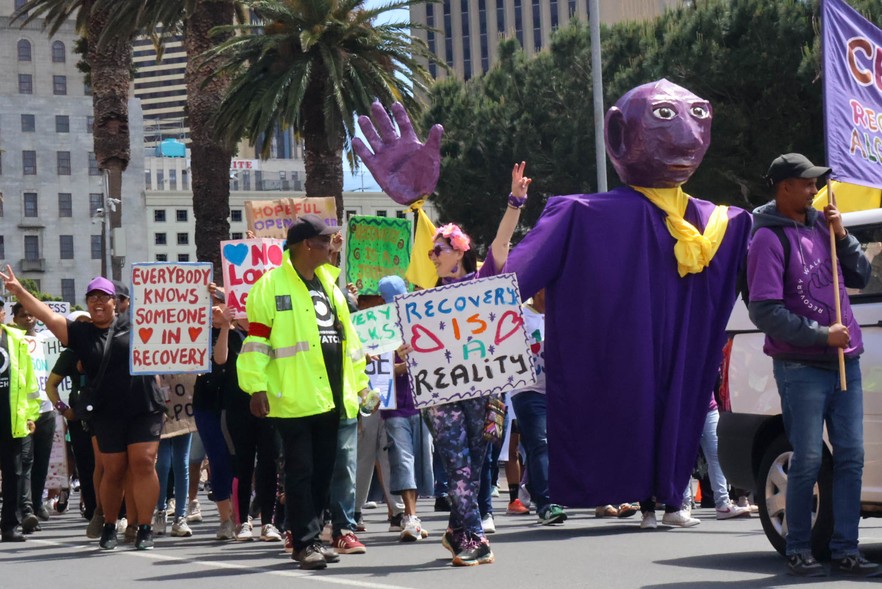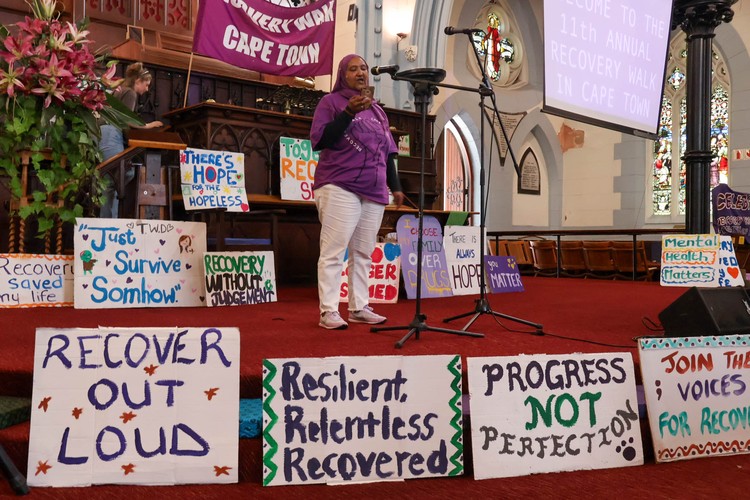Fighting addiction: march for recovery-friendly events
“Sharing my recovery with others has kept me grounded,” says Gakeema Solomons at annual Recovery Walk
About 200 people participated in the annual Recovery Walk in Cape Town. Purple is the colour used to symbolise recovery from addiction. Photos: Liezl Human
“Today, I’m not ashamed to say I’m a recovering addict, because I went to hell and I’ve come back a new and better person,” said Gakeema Solomons, a recovering drug user who has been sober for over eight years. She was speaking at the Recovery Walk on Saturday.
About 200 people marched through Cape Town to Parliament for the annual Recovery Walk, an event that celebrates recovery from substance use.
Solomons said she was participating “to celebrate and share hope with the hopeless”. She described how drugs caused “total destruction in all areas of [her] life”. When she started her twelve-step programme, she was taught “how to create a life for myself where drugs weren’t an option”.
Solomons also reached out to people in recovery across the world using social media. “These recovering addicts all around the world were recovering out loud on their platforms, and I was inspired,” she said.
“Sharing my recovery with others has kept me grounded, humble, and grateful,” she said.
In the Central Methodist church, Gakeema Solomons speaks about her recovery before the Recovery Walk on Saturday.
The participants in the Recovery Walk handed over a memo at Parliament to Francine Higham, Cape Town’s mayco member for Community Services and Health. Higham said she looked forward to collaborating in the future. “There’s such a wonderful spirit here,” she said.
Their memo acknowledged the “significant strides” by the Western Cape provincial government, through the Western Cape Substance Abuse Forum (WCSAF), and the City in “expanding treatment options for mental illness and substance use disorders”, partnering with organisations, and developing progressive policies.
“Stigma, discrimination, and silence continue to prevent many South Africans from seeking help or sustaining long-term recovery,” reads the memorandum.
The memo called on the government to support a recovery-friendly public culture, including alcohol-free and drug-free public spaces and events, to endorse the Recovery Walk, to provide logistical and funding support for the Recovery Walk, and to feature recovery campaigns “to highlight hope and possibility”, among others.
Debbie Bub, Recovery Walk committee member and occupational therapist, said that the Recovery Walk was an opportunity for people in recovery to have an event where recovery was the “central focus”.
“Think about how many events are happening that are threatening to recovery…If you are in recovery, you actually have to avoid so much socially,” said Bub. She said there was a need for more events where people in recovery could attend without being at risk of losing their recovery.
Support independent journalism
Donate using Payfast

Don't miss out on the latest news
We respect your privacy, and promise we won't spam you.
Next: School children march for better policing after taxi driver allegedly rapes girl
Previous: Three spaza shopkeepers shot by extortionists in Phillipi
© 2025 GroundUp. This article is licensed under a Creative Commons Attribution-NoDerivatives 4.0 International License.
You may republish this article, so long as you credit the authors and GroundUp, and do not change the text. Please include a link back to the original article.
We put an invisible pixel in the article so that we can count traffic to republishers. All analytics tools are solely on our servers. We do not give our logs to any third party. Logs are deleted after two weeks. We do not use any IP address identifying information except to count regional traffic. We are solely interested in counting hits, not tracking users. If you republish, please do not delete the invisible pixel.


